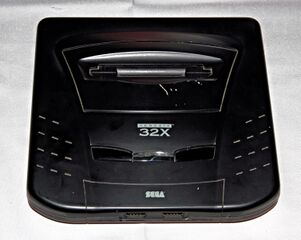Sega Neptune
From Sega Retro

|
| Sega Neptune |
|---|
| Manufacturer: Sega |
Sega Neptune was a two-in-one Sega Mega Drive and Sega 32X console announced by Sega but never released to the public. Some sources claim the intended name for the console in North America was Genesis 32X System.
Sega had admitted how expensive and problematic the 32X was, and so decided to make a combined version of the Mega Drive and 32X, which they felt was a better idea. However, by the time a prototype came out, the Sega Saturn was ready for release. Sega felt that gamers would now not be interested in the Sega Neptune, if it had been released, so the project was scrapped. Plans for the system supposedly included the ability to play Sega Mega-CD titles too.
Had the Neptune been released, it would have been available in late 1995[1] for $149.99 in the United States[2], rising to around $220 with a game[3], and £200 in the United Kingdom. The 32X version of Virtua Fighter was meant to debut alongside the system[4].
In 2001, gaming magazine Electronic Gaming Monthly announced that prototype copies of the Neptune had been found at a warehouse and were up for sale to the public (via the now defunct Seganeptune.com website). This was an April Fool's joke, but generated a lot of buzz amongst the Sega community.
Status of prototype models
It is not known how many Neptune prototypes were made, however one, easily identified by what appears to be splatters of white paint, currently tours with the Videogame History Museum, appearing in locations such as the US National Videogame Muesum in Dallas, Texas, E3, Game Developers Conference and the annual Classic Gaming Expo formed by the same people. The prototype isn't thought to contain any electronics, just a combination of wood and plastic to give the impression of a near-final system.
The Neptune's release into the wild is thought to have been caused by former Sega of America employee Clint Dyer, who is also thought to have sold several prototypes of unreleased Mega Drive and Mega-CD games around 1999/2000, most notably Sonic Crackers[5].
Magazine articles
- Main article: Sega Neptune/Magazine articles.
External links
References
- ↑ Next Generation, "February 1995" (US; 1995-01-24), page 24
- ↑ Electronic Gaming Monthly, "January 1995" (US; 199x-xx-xx), page 56
- ↑ GameFan, "Volume 3, Issue 3: March 1995" (US; 1995-xx-xx), page 106
- ↑ Sega Magazine, "March 1995" (UK; 1995-02-15), page 12
- ↑ http://www.nintendoplayer.com/unreleased/sonic-crackers/ (Wayback Machine: 2013-05-21 19:11)
